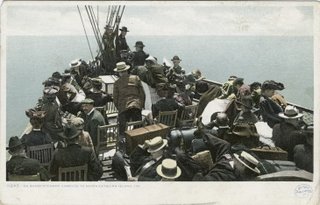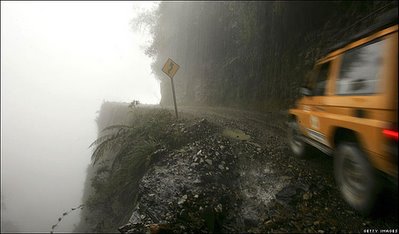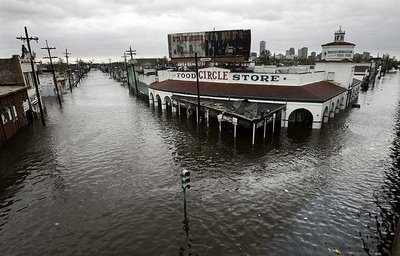It's come to my attention that Atrios, Thers, and NYMary are trying to terrorize people with YouTube clips.
I'm in an indulgent mood tonight, so I'll let it pass...for now. However, let this serve as fair warning that I'm quite prepared to unsheathe my claws, if needs be.
Saturday, December 30, 2006
Weapons of Mass Destruction
Posted by
Phila
at
6:36 PM
5
comments
![]()
Friday, December 29, 2006
Friday Nudibranch Blogging

This photo of Ceratosoma trilobatum was taken by Tanguero56; click the link to see more of his work.
Posted by
Phila
at
5:33 PM
1 comments
![]()
Tag: nudibranchs
Friday Hope Blogging

Peter Leyden has a prediction for 2007:
American politics is entering a transformative period that is roughly analogous to a handful of other periods in American history....What happened then, and is happening now, is that fundamental economic and social restructuring gets to the point where the old politics don’t work, particularly conservative formulas that look backward. The new world’s new challenges go unsolved, and problems build to the breaking point – then a new politics begins.That's pretty accurate, it seems to me. I doubt the "new politics" will go quite as far in the direction of sanity or morality as I'd like, but our biggest hurdle has always been noticing - or admitting, I should say - that there's a problem. I think it's fair to say that 2006, we made some impressive progress in that regard.
I also think it’s going to be very hard to be a climate denialist in 2007, and that the collapse of this industry is going to have uncomfortable repercussions for free-market fanatics in general. These people are long overdue for the ash-heap, God knows, because…well, because they’re incredibly fucking stupid, basically. Our conservatarian overlords have held back progress for decades, largely out of ill will, but I don’t think they’re going to be able to manage it for much longer. Not because Americans are suddenly going to start hugging trees or worshipping dirt, but because we’ve reached a point where it’s become obvious even to the timid, stolid "visionaries" who make up corporate America that there’s at least as much money to be gained by solving problems as by pretending they don’t exist.
Apropos of which, the Bush administration is talking about listing the polar bear as a threatened species:
The Bush administration has decided to propose listing the polar bear as threatened under the Endangered Species Act, putting the U.S. government on record as saying that global warming could drive one of the world's most recognizable animals out of existence.I hesitate to speculate on the logic behind this proposal, or how it might play out in terms of policy. But if it goes through, I think it’s safe to say it’ll be an epochal decision.
The same goes for Wal-Mart’s tentative plan to install solar power in stores in five states:
Wal-Mart doesn't mention a specific purchase size, but my sources tell me that the company could put solar on as many as 340 stores in the next few years. Assuming that each store utilized about 300 kilowatts of solar panels (it could be as much as 500 kilowatts), we're talking roughly 100 megawatts of solar. To put that into perspective, the solar system currently being installed at Google headquarters in California -- the largest single corporate solar installation in history -- is 1.6 MW, about 1/60th the size.Meanwhile, the Democrats have come up with a nice way to ring in the new year:
House Democrats in the first weeks of the new Congress plan to establish a dedicated fund to promote renewable energy and conservation, using money from oil companies. That's only one legislative hit the oil industry is expected to take next year as a Congress run by Democrats is likely to show little sympathy to the cash-rich, high-profile business.Let’s hope they’re serious about it, and can actually pull it off. It probably wouldn’t hurt to ask your rep to support the plan.
A new study suggests that reducing infections in intensive care units is not all that hard to do:
Hospitals will quickly slash the rate of common, costly and potentially lethal catheter-related bloodstream infections in their intensive care units (ICUs) by using cheap, low-tech, common-sense measures like hand washing, timely removal of unneeded catheters, and use of sites other than the groin to place lines when possible, according to a report from safety experts at Johns Hopkins in the Dec. 28 issue of the New England Journal of Medicine.Amazing, eh? And remember: You heard it here first!
"There's just no reason any more not to do these relatively simple things," says Peter Pronovost, M.D., professor of medicine and medical director of Hopkins' Center for Innovation [!] in Quality Patient Care….
Wisconsin has had some luck with re-establishing the trumpeter swan:
Successful efforts to re-establish trumpeter swans in Wisconsin have resulted in a flock that last summer numbered more than 500 swans. Now these majestic, but still endangered, birds are expanding their range into the central and even southern parts of the state.Numbers of whooping crane and ruffled grouse are also increasing.
In Washington, the Nature Conservancy sealed a deal with local farmers to flood fields for the benefit of waterfowl:
Each man has committed about 70 acres to this project, which is called Farming for Wildlife. A third of that land will be flooded with a few inches of fresh water in the spring, fall and winter. This will create shallow ponds to entice thousands of birds, some of them on their way to and from the Arctic, to stop and snack on tiny invertebrates and worms as they travel along the Pacific flyway.Also in Washington, the destruction of the Goldsborough Dam has done wonders for the salmon population:
The farmers see the Nature Conservancy’s willingness to pay them as an acknowledgment that they should not be expected to sacrifice their land or their living for wildlife. This approach effectively turns shorebirds into another crop to manage, instead of grounds for a lawsuit."
Along the way, scientists are getting a glimpse of what can happen when a dam, albeit a small one, is demolished: As fish gradually reclaim their former habitat, Goldsborough Creek is becoming a more important source of salmon for the southern tip of Puget Sound.A small village in Trinidad has managed to prevent Alcoa from siting a smelter on their farmland:
Though small, this dam is a harbinger of things to come in the Northwest. Seven dams in Washington and Oregon, including two big dams on the Elwha River in Olympic National Park, are slated for demolition in the next five years.
Bowing to a year of stormy protests, Prime Minister Patrick Manning said the government was scrapping plans to open an industrial park in Cap-de-Ville, in a sleepy, southeast farming region where the US$1.5 billion smelter was to have been located.The new plan is to site the smelter offshore. But something tells me it may run into some snags:
"We have a consensus. We will protest," said Suresh Seepersad, a spokesman for the Otaheite Fishermen's Association. "As fishermen and residents of the area, we will be ready to die for this cause," he said.Alcoa has also been obliged to shut down a polluting plant in Texas:
The consent decree stemming from the 2002 federal court lawsuit filed by Neighbors For Neighbors Inc., Environmental Defense and Public Citizen Inc. citing air pollution from Alcoa’s aging Sandow Power Plant, required Alcoa to upgrade the power plant, shut down the power plant or decommission the plant and rebuild - the option Alcoa chose....Researchers in the UK are about to commence human testing of a universal flu vaccine. Caveat lector is my advice, but there’s no reason you can’t keep your fingers crossed. If all else fails, the town of Croydon is seeking alternative strategies for disposing of corpses:
BURIALS in unmarked graves with bio-degradable coffins may be the only way to beat pollution and a chronic lack of graveyard space in Croydon.Southeast Asia is getting tough on wildlife poachers:
Long outgunned and outmaneuvered by smuggling gangs, the 10-member Association of Southeast Asian Nations agreed last year to form the Wildlife Enforcement Network to combat a black-market trade in plants and animals that generates $10 billion in revenue each year -- third behind illicit dealings in weapons and drugs.Apparently, the USA has contributed $2.7 million to anti-smuggling groups. That’s good, but more would be better. In addition to being reprehensible and stupid, this trade poses a serious public health risk.
Speaking of Southeast Asia, a plant native to Ambon may be a valuable weapon against diarrhea (which, as I always feel compelled to mention, kills 1.8 million children per year):
A unique Mayo Clinic collaboration has revived the healing wisdom of Pacific Island cultures by testing a therapeutic plant extract described in a 17th century Dutch herbal text for its anti-bacterial properties. Early results show that extracts from the Atun tree effectively control bacteria that can cause diarrhea, as claimed by naturalist Georg Eberhard Rumpf, circa 1650. He documented his traditional healing methods in the book Ambonese Herbal.Rumphius is an endlessly fascinating character, by the way, and the story of how his work was written and published is truly harrowing:
After going blind in 1670, Rumphius continued work on his six-volume manuscript with the help of others….In 1687, with the project nearing completion, the illustrations were lost in a fire. Persevering, Rumphius and his helpers first completed the book in 1690, but the ship carrying the manuscript to the Netherlands was attacked by the French and sank, forcing them to start over from a copy that had fortunately been retained. The Herbarium Amboinensis finally arrived in the Netherlands in 1696. However, "the East India Company decided that it contained so much sensitive information that it would be better not to publish it." It finally appeared in 1741, thirty-nine years after Rumphius's death.The Ambonese Curiosity Cabinet is beautifully written and illustrated; it’s one of my favorite books of natural history.

You can get it cheap from Amazon sellers, or – sad to say – in bookstores that carry remaindered titles.
The picture at the top is titled "Solar Effect in the Clouds – Ocean" (1856). It's part of a glorious online exhibition of photographs by Gustave Le Grey. I was also very impressed, this week, with an exhibition called The Human Factor, which showcases "The Industrial Life Photograph Collection" at the Harvard Business School's Baker Library. Here's a 1934 photo of silverware being electroplated:

BibliOdyssey has made a last-minute bid for best post of the year with a collection of images of stilt walkers. Here’s an evocative sample:

Almost as remarkable as this illustration is the title of the book whence it came: Across the Great Saint Bernard: the Modes of Nature, and the Manners of Man (A.Sennett/H.Percival, 1904). That’s right up there with John Stewart’s Roll of a Tennis Ball Through the Moral World (1812).
Last, in administrative news, I've been trying to post more frequently at Injudicious Gardening, which is my online commonplace book. I've also created a blog called Dime Geography as a dumping-ground for photos I've taken while on my appointed rounds. Not much there at the moment, but I hope to do more with it in the coming year. Oh, and Abie will be glad to know that I intend to switch to the new Blogger over the weekend, which'll apparently allow me to use tags.
Posted by
Phila
at
5:26 PM
1 comments
![]()
Tag: hope
Saturday, December 23, 2006
Stick Figures in Peril

This photo was taken by Uh...Bob. It's part of the Stick Figures in Peril Flickr pool.
"Although affliction cometh not forth of the dust, neither doth trouble spring out of the ground; yet man is born unto trouble, as the sparks fly upward."
Posted by
Phila
at
7:44 PM
2
comments
![]()
Friday, December 22, 2006
Friday Nudibranch Blogging

The lovers of Glossodoris cruenta are
Happy, cheerful, well-fed;
As for me, my arms are broken
Through having hugged the clouds.
(Photo by Jun Imamoto.)
Posted by
Phila
at
5:01 PM
3
comments
![]()
Tag: nudibranchs
Friday Hope Blogging

San Francisco and Oakland are requiring restaurants to stop using styrofoam containers:
[T]he new laws not only ban the foam but also encourage food establishments to reduce their use of all plastic in favor of materials that are biodegradable or can be composted, such as SpudWare, the trademark for cutlery made of potato-starch.Here's hoping they'll also require restaurants to capture and use waste heat:
Take a peek inside the kitchen of any busy restaurant and you'll quickly realize there's a lot of heat being produced, and wasted. Ovens are constantly on and being opened, grills sizzle with burgers and steaks, pots boil with soups, sauces and pastas, and hot water and steam wash dishes and cutlery. Where does all that heat go? Well, it usually gets sucked up an exhaust stack and released into the air.The batfish has apparently changed its eating habits, which is good news for coral reefs:
Meanwhile, under a separate process, natural gas is typically used to heat up municipal water and, in the winter, the fresh air coming into a restaurant through an intake vent.
"Why buy gas to heat a restaurant when thousands of dollars of that heat is sent up an exhaust stack every month?" says Jeff Martin, president of Martin Air Systems.
The Burlington entrepreneur says there's no reason for such waste – and he's proving it. For the past three years his company has retrofitted a number of restaurants around the GTA with a system that captures otherwise wasted kitchen heat and uses it to pre-heat water and restaurant air.
Scientists at the ARC Centre of Excellence for Coral Reef Studies (CoECRS) who were studying how coral reefs are lost to weed were astonished when, after removing a cage from a particularly weedy bit of reef, the rare batfishes emerged out of the blue and cleaned up most of the weed.Most people would rather save coral reefs than parasitic flies, but the latter - amazingly enough - have their uses:
A parasitic fly may revolutionize hearing aid technology. Cornell's Chronicle reports how researchers there and elsewhere have found the Ormia ochracea fly has amazingly acute hearing, able to detect the location of a sound within two degrees. Heretofore such acuity was thought possible only in large creatures like humans, whose ears can be placed many centimeters apart, but these flies' entire bodies are smaller than the smallest hearing aids today.The Coast Guard's plan to shoot millions of rounds of lead ammo into the Great Lakes is dead. (That'll learn 'em to go up against Interrobang.) And Boston is requiring all new large buildings to meet green building standards.
The bushmen of Botswana have won a landmark case against the Botswanan government:
Judges in Botswana ruled two-to-one that the country's government removal of thousands of bush people from their ancestral lands was illegal and unconstitutional. The government moved the bush people to another settlement, which the bush people argue was a "poverty trap"...Inhabitat reports on FuseProject's XO computer, which is designed for technologically underprivileged children:
The ruling is seen as a wider test of whether governments can legally move people from their tribal and ancestral lands."
The device boasts a slew of streamlined features, from its Wi-Fi antenna “rabbit ears” and energy-efficient LCD to the digital writing tablet and integrated video camera. Networking capabilities allow children to connect to each other, their school, their teacher, and the Web. And if that weren’t enough, the machine runs off of power from a variety of sources- from rechargeable batteries to hand cranks, and eventually solar energy. When closed, the laptop features an integrated handle and is completely protected from dust and dirt, allowing each student to transport their laptop to and from school. Aesthetically, the XO is simple yet kid-friendly, engaging, tactile, and even anthropomorphic.The Public Library of Science (PLoS), a nonprofit group "committed to making the world's scientific and medical literature a freely available public resource," has launched a new open-access site:
PLoS ONE will accelerate the pace of scientific research because publication is faster and more interactive than ever before. No longer need there be months of delay between submission and publication. Now there is a way to share not only the results of research but also the responses, ideas, and opinions of fellow researchers as well.And in a rather lovely confluence of religion and reason, synagogues are using Hanukkah as a example of making the most of one's energy resources:
The central tale of the holiday involves a lamp in a liberated temple burning for eight days when the Jews had enough oil for only one day. As a result, Jews light a nine-armed candelabra, often called a hannukiah or menorah. Eight arms represent the days, and the ninth is for a symbolic candle used to light the others....Flickeur (via Coudal) is an amazing site created by Mario Klingemann, which randomly assembles "films" from images on Flickr.
But synagogues this Hanukkah are celebrating the light-oriented holiday by launching energy audits, giving out CFL bulbs to congregants and chanting a newly written "installation prayer" for the changing of the bulbs.
Flickeur works like a looped magnetic tape where incoming images will merge with older materials and be influenced by the older recordings' magnetic memory. The virtual tape will also play and record forward and backward to create another layer of randomness. This principle will create its own sometimes very suggestive or scary story.American Landscape and Architectural Design, 1850 – 1920 comprises 2,800 magic-lantern slides featuring “views of cities, specific buildings, parks, estates and gardens," including the Winsor McCay-esque view of San Francisco at top. Not sure how I missed this site, but I’ve been making up for lost time all week!
Vilar allows you to search a huge database of of architectural and landscape features, by century, country, and typology. If you’re looking for pictures of 16th-century French archways, this is the site for you! Unless, that is, you're bothered by high-maintenance interface and confusing navigation, in which case you should proceed directly - without passing "Go" or collecting $200 - to this gallery of postcards from the Detroit Publishing Company:
 I also recommend Jim Reed's photos of "severe and unusual weather." And, via Things, this gallery of photos from the drowned village of Lago di Vagli.
I also recommend Jim Reed's photos of "severe and unusual weather." And, via Things, this gallery of photos from the drowned village of Lago di Vagli.
Posted by
Phila
at
3:45 PM
1 comments
![]()
Tag: hope
Thursday, December 21, 2006
Huh?

While it's not as damning as Bill Bennett's observation that people like Al Gore are complaining about global warming while it's snowing (in the Northern hemisphere, at least), Iain Murray has detected a fairly lurid example of climate-alarmist hypocrisy:
When the Republicans controlled both houses of Congress, we heard repeatedly that Congress was blocking urgent action on global warming and that something had to be done NOW before it was too late. Now, with people who have argued that hearings on the matter were a waste of time in charge, the Pew Center on Global Climate Change simply states:One can be forgiven for assuming that "them" refers to the Pew Center on Global Climate Change, which generally takes a business-friendly, market-based approach to emissions reduction. Here's president Ellen Claussen speaking at Yale in March of 2006:[W]e are optimistic that enactment of mandatory US climate action is plausible by 2008 and likely by 2010.Huh? Where are the demands for action now? What can have changed to calm them down so much? It's almost as if this is merely a political issue to leverage for further electoral gain, not the crisis they've been banging on about.
[W]e’ve seen an up-tick in Congressional interest in this issue. Granted, these proposals may not become law right away, probably not before 2008, but I believe it is only a matter of time before limits on greenhouse gas emissions are in place.And here she is in 2004:
The United Kingdom...has set 2 goals, a near term goal of a 12.5-percent greenhouse gas emission reduction by 2012 and a longer term one for a 60-percent reduction within 50 years. The United States needs to adopt something similar....I'm nitpicking, of course. The larger question is, if climate change alarmism truly provides effective "leverage for further electorial gain," then why on earth would these wild-eyed one-worlders ever stop "banging on about" it? You'd think they'd be emboldened to ramp up the rhetoric in hopes of bigger and better victories.
In Murray's defense, it's quite possible that he's stupid enough to be arguing in good faith. The denialists I find really disturbing are the ones who choose to present themselves to the world as blithering nitwits.
Posted by
Phila
at
9:25 PM
1 comments
![]()
Tag: denial industry
Blood and Bravery

Jack Valenti, that rather…excitable gentleman who formerly headed the Motion Picture Association of America, explains how he taught his son about the importance of military sacrifice. He took the lad to Omaha Beach, and delivered himself of this speech:
"John, I want you to know why I brought you here." He looked puzzled. I said, "I wanted you to understand that these boys, who never knew you, nonetheless gave you the greatest gift one human can give another. They gave you the gift of freedom. They bought and paid for that gift in blood and bravery. They made it possible for you and millions like you to never have to test your own courage to see how you would react when the dagger is at the nation's belly and death stares you right in the face. You owe them a debt you will never be able to repay."You might think that this story would end with the fruit of Valenti’s loins joining the service and going boldly forth to fight the Hun. But the reality’s a bit more drab:
We never spoke about this again until one day years later, he phoned me. "Dad, last night I saw Saving Private Ryan. You were right. They never turned back, not a one. They kept coming." His voice trembled as he spoke.In other words, Valenti went to all the trouble and expense of traveling to Normandy in order to give his kid a deeper appreciation of a Spielberg movie.
Somehow, my own voice cracked a bit with gratitude. My son remembered.
Having demonstrated these bona fides, Valenti asks, "Does the next generation value the sacrifice of war?"
I guess we'll have to wait and see how choked up they get during Live Free or Die Hard.
Incidentally, John Valenti had a brief career as an actor. His most notable accomplishment was playing his father in the film Path to War, which was about the Johnson administration’s decision to escalate the Vietnam War.
Posted by
Phila
at
3:02 PM
1 comments
![]()
The Best and the Brightest

In a mid-year budget review, Australia’s treasurer announces that his drought-stricken country’s economy will thrive next year, as long as it rains:
The new spending included $300 million for projects which Mr Costello refused to reveal, and more than $1 billion for drought relief. He warned that this figure would balloon if the drought continued.Canada’s public safety minister has been instructed to remove comments from his website that made fun of the science behind global warming:
The controversy coincides with new signals from Prime Minister Stephen Harper that the government plans to boost its environmental policies and overall plan to fight climate change and air pollution. Harper has spent the past few days insisting in a series of interviews he believes it's time to act to stop global warming because of mounting evidence that the climate is changing.Meanwhile, two of India’s islands seem to be missing:
Official records list 102 islands in Indian Territory, but scientists examining satellite imagery now say two have disappeared and a dozen more could go under. The Sunderbans are a natural buffer shielding millions from storms and tidal waves whipped up in the Bay of Bengal.In the South Pacific, the Carteret Islands are facing the same fate:
“We have no cars and no factories and no aeroplanes,” says Bernard Tubin, a leader on the island of Piul. “We are the victims of this greenhouse-gas emission and we are totally innocent. America sends someone to the Moon, wars are being fought and millions are being spent on warheads and ammunition. So why is it that Russia and the US and Japan and Australia cannot do anything to help us?”In China, officials have been colluding with mine bosses to overlook safety violations:
Investigations of the deadliest mine accidents last year found that many were due to the failure of officials to enforce safety standards, Li said. He said some took bribes or illegally owned shares in mines they were supposed to regulate.And in South Korea, official have been colluding with developers to falsify water-safety reports:
Water quality test labs and underground water developers stand accused of conspiring to fake test results and providing polluted water to 1,410 nurseries and schools nationwide.In India, children’s toys are manufactured with scrap plastic containing high levels of lead and cadmium:
India does not have any enforceable standards for lead, cadmium and other toxic materials in toys and hitherto soft PVC toys have not been investigated as one of the possible sources of these metals’ exposure to children. These soft toys, the study says, account for 35 per cent of the total production of India’s toys.U.S. policies ostensibly intended to help family farms are helping to destroy them:
[O]wners of large farms receive the largest share of government subsidies. They often use the money to acquire more land, pushing aside small and medium-size farms as well as young farmers starting out.Furthermore, the FDA intends to close laboratories charged with protecting the public against intentional and accidental food contamination:
The U.S. Food and Drug Administration is planning to close as many as half of its laboratories across the country, despite pending appropriation increases to expand this lab network to fight bio-terrorist attacks on our food supplies, according to documents released today by Public Employees for Environmental Responsibility (PEER).In other news, shocking new photos indicate another Miss USA contestant may be a drunken whore. The question now raging is whether America can stand the strain of ongoing suggestive behavior among its sexually commodified young women.
Also, President Bush would like you to go shopping more.
Posted by
Phila
at
1:18 PM
0
comments
![]()
Wednesday, December 20, 2006
Stabbed in the Back!

As you can see, PZ Myers has let the cat out of the bag.
Granted, he didn't plot the sparse matrices of Levinasian/Derridean Otherness, or situate this inscription properly on the Body Without Organs, but the damage is done.
Obviously, we're going to have to move to Plan B (and I'm not talking about the drug we use to murder babies and encourage worry-free sexual experimentation among teenagers).
In the meantime, let's hope Comrade Myers is working diligently on his self-criticism.
Posted by
Phila
at
10:42 AM
3
comments
![]()
Tuesday, December 19, 2006
The Flea's Waltz

From the anti-Parnassus of his padded cell at WND headquarters, Bob Unruh is proposing that “separation of church and state” should be reinterpreted to mean that federal courts can't rule on cases relating to the separation of church and state. This is in support of a bit of grandstanding by the Louisiana state legislature, which recently issued this toothless challenge to federal lawmakers:
Whereas, the Louisiana Legislature recognizes that this is the season to give gifts and be charitable and an integral part of the season is the inclusion and acknowledgment of Jesus Christ, therefore, be it resolved that the Legislature of Louisiana memorializes the Congress of the United States to adopt the Constitution Restoration Act, thereby reducing the caseload of our federal courts by removing from their jurisdiction any and all cases involving the acknowledgment of God as the sovereign source of law, liberty, or government as authorized by Article III, Section 2, of the United States Constitution.Aficionados of nightmare illogic, preening pharisaism, and low-grade delirium may want to read the full document. Here’s my favorite part:
WHEREAS, Chief Justice Rehnquist in the Texas case referred to the duplicity of the United States Supreme Court in telling local governments in America that they may not display the Ten Commandments in public buildings in their communities while at the same time allowing these same Ten Commandments to be presented on these specific places on the building housing the United States Supreme Court stating, "Since 1935, Moses has stood holding two tablets that reveal portions of the Ten Commandments written in Hebrew, among other lawgivers in the south frieze.The “other lawgivers” on the south frieze include heathens like Confucius, Solon, and Draco, all of whom are wailing in Hell as we speak. And the north frieze includes – wait for it – the archfiend Mohammed. If any state courthouses want to follow the Supreme Court’s lead in this regard, it's no skin off my nose.
Most of Unruh's article simply transcribes a somniloquy by retired judge Darrell White, which climaxes in this rapturous kerygma:
"Wouldn't it be like God for Hillary Clinton to grab onto this and say, 'I can get some mileage out of this,' or have Obama whatever-his-name-is say, 'I'm going to do this,'" White told WND.Yes, that’s just what we're missing in this country: a truly bipartisan commitment to idolatry, cynicism, narcissism, and faux-spiritual busywork. (Well, that and a return to sensible names for colored folk, like "Rufus Rastus Johnson Brown.")
Now, let's put aside all this foolishness, and consider the delicate science of flea-training, as set forth by a nineteenth-century adept:
They are placed in a reversed position to each other - one looking one way, the other another way. Thus tied, they are placed in a sort of arena on the top of the musical box; at one end of the box sits an orchestra composed of fleas, each tied to its seat, and having the resemblance of some musical instrument tied on the foremost of their legs.
The box is made to play, the exhibitor touches each of the musicians with a bit of stick, and they all begin waving their hands about, as performing an elaborate piece of music. The fleas tied to the gold paper feel the jarring of the box below them, and begin to run round and round as fast as their little legs will carry them.
This is called the Flea's Waltz.
Posted by
Phila
at
4:31 PM
1 comments
![]()
My Appointed Rounds

Arms Control Wonk demolishes the DSB Task Force report on nuclear capabilities, and erects a veritable palace of snark in its place:
Concerned citizens should be aware, the authors warn, of “an entrenched set of views held by an influential segment of the U.S. population” ... crazy views like …At WhirledView, Cheryl Rofer dissects the “existential threat” of nuclear terrorism:
- smaller, less alert forces would be good;
- US emphasis on nuclear weapons might encourage proliferation;
- nonproliferation is more important than deterrence after the end of the Cold War;
- nuclear weapons should only be used to deter other nuclear threats; and
- that new nuclear weapons might just generally be a bad idea.
Al-Qaeda and similar organizations have the motivation, but they have so far not managed to motivate weapons designers, experienced or incipient. Some may be disaffected, but those who have worked on nuclear weapons understand well the gravity of their special knowledge. Those who have this kind of expertise outside the weapons community are able to hold good jobs, integrated into their societies. There are always a small number of criminals and sociopaths, and recent unhappiness at the weapons labs suggests that some susceptible people might be turned. Recruitment would have to be underground, through contacts that al-Qaeda probably doesn’t have.Effect Measure discusses the death sentence in the case of the Tripoli Six:
Science and justice have been on trial in Libya and both have lost. Today a Libyan court again condemned five Bulgarian nurses and a Palestinian doctor to death by firing squad after a retrial widely seen as unfair because it excluded exculpatory scientific evidence….If I were to say that this Libyan court comprises subhuman vermin who ought to be boiled in their own fat, I probably wouldn’t get many complaints from the guardians of our discourse. But when David Roberts suggests a Nuremberg-style trial for climate denialists – who also have a certain hostility to science, and a certain disregard for human life - it’s an intolerable breach of civility. Thers explains why:
To grasp the full meaning of a particular "bad" expression in a particular utterance of same, what matters is the position of the speaker within the wider linguistic marketplace, a space of competing interests and valences. Which I know sounds like dirty water being squirted from an old rubber ball. But still.Speaking of competing interests and valences, Subtopia’s discussion of “Baghdad’s guillotined real estate” includes a map that has to be seen to be believed.
[…]
Pierre Bourdieu argues that the struggle within any specific social field is to establish the dominant definition of legitimate discourse. And he's right, motherfuckers.
And with that in mind, here’s Echidne on valuing human life:
[O]ur willingness to spend money to prevent deaths is much greater when we have some knowledge of the person or persons saved. This knowledge makes the case real and the urgency greater. A similar thing happens with those who are dying in Iraq. As long as they are just numbers the deaths don't really hit us deeply. But once we are given names and other details (an old man, a child, a pregnant woman) we become more concerned.(Photo at top depicts Bolivia's North Yungas Road - one of the most dangerous roads in the world. Via Things.)
Though all this may be natural, it can mean bad ways of spending our prevention dollars. But then it is linked to another silly thing we humans do: Not giving much credit to those who prevented catastrophes from happening while praising and adulating those who make a mess of the prevention but manage to control the catastrophe at the last minute.
Posted by
Phila
at
11:40 AM
0
comments
![]()
Tag: omniana
Monday, December 18, 2006
A Cascade of Consequences

A fascinating article on Chinese cashmere convincingly portrays U.S./China trade as a dance of death:
[B]ehind the inexpensive Made in China tag is something Americans rarely see: the cascade of consequences around the world when the full might of Chinese production and U.S. consumption converge on a scarce natural resource….Goats aren’t the only thing turning China into a moonscape, as I discussed in this post on the facai trade. The cashmere boom stems from increased availability at lower prices, while the facai trade is based on limited availability at higher prices. Either way, though, the result is the same: desertification.
The country's enormous herds of cashmere-producing goats have slashed the price of sweaters. But they also have helped graze Chinese grasslands down to a moonscape, unleashing some of the worst dust storms on record. This in turn fuels a plume of pollution heavy enough to reach the skies over North America.
Shatar called his goats once more, and the animals trudged into view. Their wispy coats fluttered in the wind. They limped up a hill and slumped to the ground around him. They were starving.In addition to a shortage of grass, there's a shortage of water; this is a region that gets six to twelve inches of rain per year. "And yet," as an anonymous Mancunian once said to Friedrich Engels, "there is a great deal of money made here."
With U.S. demand at an all-time high, companies continue to build new factories and buy more expensive equipment--putting themselves deeper in debt. That glut of production, in turn, pushes prices ever lower.Behold the awesome power of market forces! And while you're at it, behold the awesome power of global air circulation:
"We had one storm in East Asia which we called the perfect dust storm," said Barry Huebert, an oceanographer at the University of Hawaii. "There are good images of it following over the Pacific as a yellow plume. When it got to Colorado, it reduced visibility enough to make the national news.As gruesome as this story is, it’s gratifying to see such a thoughtful, thorough article in a major American paper. Plenty of journalists would feel they’d been sufficiently hard-hitting once they’d discussed the social ramifications of cashmere losing its snob appeal.
I'll come back to this issue in a moment, but first, let's look at a similar problem a bit closer to home.
To paraphrase William Blake, “If the fool would persist in his folly, he would become a proponent of mitigation banking.” I said farewell some time ago to the few illusions I had about this “market-based solution” to the destruction of wetlands. But for some strange reason, my loud-thundering disapproval seems not to have impressed anyone.
Perhaps people will listen to the St. Petersburg Times, which has an excellent special report on this appalling shell game. It's worth reading in full, but this anecdote will suffice for now:
On a broiling August morning, two would-be developers, D. Miller McCarthy and Alan Fickett, turned themselves in at the Polk County Jail. Deputies took their fingerprints and snapped their mug shots.What's the connection between Florida's woes and China's? Well...mitigation banking, basically:
The state of Florida had charged the pair and their corporation with seven felonies and nine misdemeanors for allegedly building unauthorized roads that destroyed wetlands at the edge of the Green Swamp, the headwaters of most of the major rivers in Central Florida....But a judge ruled officers had bungled a search of the company's offices and excluded the evidence. Prosecutors dropped all charges.
McCarthy and Fickett reinvented themselves. They launched a company called Ecobank and became the kings of a fledgling industry called wetland mitigation banking, which makes it easier for developers to wipe out swamps and marshes.
Their biggest customer? You, the taxpayer.
[A] decision in Beijing in 1994 to require that all cropland used for construction be offset by land reclaimed elsewhere has helped create the ecological disaster that is now unfolding. In an article in Land Use Policy, Chinese geographers Hong Yang and Xiubein Li describe the environmental effects of this offset policy. The fast-growing coastal provinces, such as Guandong, Shandong, Xheijiang, and Jiangsu, which are losing cropland to urban expansion and industrial construction, are paying other provinces to plow new land to offset their losses. This provided an initial economic windfall for provinces in the northwest, such as Inner Mongolia (which led the way with a 22 percent cropland expansion), Gansu, Qinghai, Ningxia, and Xinjiang.An initial economic windfall. This is the same blind urge that leads bees into soda bottles and rats into traps, and yet we're supposed to worship it as the perfection of thought, and call anyone who questions it a fool or worse.
If foreign investors want to build office blocks on our coastal wetlands, we can simply flood a small meadow upstate. If the Chinese need to destroy their farmland in order to build factories that manufacture magnetic ribbons for our SUVs, they can simply shift their agricultural sector to the high Mongolian desert. Problem solved, and with no net environmental loss...at least on paper.
Words fail me, really, so I'll wrap things up with this quote from Adam Smith:
[W]hat is it which prompts the generous, upon all occasions, and the mean upon many, to sacrifice their own interests to the greater interests of others?....It is reason, principle, conscience, the inhabitant of the breast, the man within, the great judge and arbiter of our conduct. It is he who, whenever we are about to act so as to affect the happiness of others, calls to us, with a voice capable of astonishing the most presumptuous of our passions, that we are but one of the multitude, in no respect better than any other in it; and that when we prefer ourselves so shamefully and so blindly to others, we become the proper objects of resentment, abhorrence, and execration.
Posted by
Phila
at
10:16 PM
2
comments
![]()
Psychological Science

A new study indicates that women who describe themselves as happily married enjoy certain benefits of being in a happy marriage:
A University of Virginia neuroscientist has found that women under stress who hold their husbands' hands show signs of immediate relief, which can clearly be seen on their brain scans. "This is the first study of the neurological reactions to human touch in a threatening situation, and the first study to measure how the brain facilitates the health-enhancing properties of close social relationships," says Dr. James A. Coan, author of the study, which is published in the December 2006 issue of the journal Psychological Science....I haven't read the study in question, so I don't want to read too much into what appears, at first glance, to be a rather troubling methodology. However, I will take issue with the press release I'm quoting, which is titled "High-quality marriages help to calm nerves." A more reasonable conclusion would be that high-quality relationships help to calm nerves (as Dr. Coan himself implies). I suppose it's possible that further testing will show that women with a marriage certificate are more comforted by handholding than those without, but I suspect that'd have more to do with our cultural biases than anything else.
Coan and colleagues designed a functional MRI (magnetic resonance imaging) study in which 16 married women were subjected to the threat of a very mild electric shock while they by turns held their husband's hand, the hand of a stranger (male) or no hand at all. The MRI was able to show how these women's brains responded to this handholding while in a threatening situation.
Interestingly enough, this research was undertaken at the University of Virginia. Given that state's rabid anti-gay hysteria, I can't help wondering whether the arguably transgressive act of holding hands in a clinical setting might lessen the comforting effect of contact with a same-sex partner.
Just speculation, of course...but I'm always a bit worried about the potential for "objective" tools like MRI to naturalize oppressive social structures.
Hold my hand, won't you?
Posted by
Phila
at
1:53 PM
6
comments
![]()
Sunday, December 17, 2006
Well-Intentioned Foreigners

In 1975, not long after the fall of Saigon, the Washington Post explained patiently that bad things sometimes happen to good people:
[I]t was right to hope that the people of South Vietnam would be able to decide on their own form of government and social order. The American public is entitled, indeed obligated, to explore how good impulses came to be transmuted into bad policy, but we cannot afford to cast out all remembrance of that earlier impulse.Translation: We were nuts to think that the gooks could be civilized, but wasn't it swell of us to give them the benefit of the doubt?
In today's WaPo, Lawrence E. Harrison strikes up a variant of this tune:
The war in Iraq has produced many casualties. One lesser-noticed one may be the death of an idea -- the idea that the culture of a nation or region can be transformed quickly by well-intentioned foreigners.Much as I admire the pitiless rigor of his analysis, Mr. Harrison worries himself unnecessarily. "Well-intentioned foreigners" will always try to spread democracy by means of airstrikes and massacres, and thoughtful commentators like Harrison will always give them an "A" for effort while reminding them that some people simply aren't up to the burdensome responsibilities of civilization. One must be realistic, after all: Not everyone can be as good and caring and honest as we are.
For the past half-century, politicians and experts in rich countries have tried to improve living standards and build democracy in Africa, Asia and Latin America. Early on, they, too, were convinced that tyranny and poverty could be defeated....It's odd to read this at the end of a week consecrated by the Right to masturbating earnestly over Pinochet's corpse. But that's by the by. Harrison's point, stripped of (reduced to?) its liberal-humanist boilerplate, is that the goddamn darkies ain't right in the head:
[A]s I encountered daily the intractability of Latin America's problems, it became clear to me that poverty and injustice were rooted in the region's values.And since that's the case, Alcoa may as well cash in! That way, we get to impose or exacerbate poverty and injustice for the sake of the corporate bottom line, and display our exquisite sensitivity by weeping over the inability of the Inferior Races to become civilized. And if all else fails, we can always install or support a dictator, like Pinochet, whose ideological commitment to the free market can be measured, reassuringly, in acre-feet of blood.
Lest you think I'm being too hard on Harrison, get a load of his explanation for the troubles in Haiti:
The dominant religion in Haiti is voodoo, which nurtures mistrust and irrationality. Its roots are in the Dahomey region of West Africa -- what is today Benin. The levels of income, child malnutrition, child mortality, life expectancy and literacy are virtually identical today in Haiti and Benin.The roots of Haitian voodoo "are in the Dahomey region of West Africa," eh? I wonder why that might be.
Besides, Harrison has no reason to claim that voodoo is the dominant religion in Haiti. That distinction goes to Catholicism, which some observers - including Harrison, as we'll soon see - have found to be less than rational itself, on occasion.
But let's not split hairs. The important thing is, we've ascertained that the Haitians are painting themselves with mud and beating on their goatskin drums; their yellow eyes are rolled back in their heads, and their breasts and penises are swaying hypnotically in the Plumeria-scented breeze of a tropical midnight. Clearly, there's no point looking for civilized values there.
The situation is much the same in Latin America, sad to say. An eternal peonage ideally suits the impressionable natives of those lands; in many respects, they are little more than disobedient, lazy children, and are prone to all sorts of dangerous mischief unless kept busy. In Asia, meanwhile, the queer superstition of "Buddhism" inculcates the fatalism for which its inhabitants are famous; if life is an illusion, civilization is doubly so, and it may even be that certain of these races have sought out political tyranny, the better to transcend it by means of that unmanly quietism propounded by Siddhartha Gautama.
Where then may we find true civilization?
Some religions and cultures do better than others at promoting personal responsibility, education, entrepreneurship and trust -- all values that shape political and economic development. Protestant societies -- above all, the Nordic countries of Denmark, Finland, Iceland, Norway and Sweden -- have generally done better than Catholic nations, particularly those of Latin America. Confucian societies such as Japan, Singapore, South Korea, Taiwan and now China have produced transforming economic growth. Islamic countries, even those with oil, have not.Well, except for Malaysia and Qatar. And maybe a couple of others.
To his credit, Harrison understands that even some non-Muslim religions have an anti-progress streak:
Catholic ambivalence about free markets has contributed to Latin America's costly dalliances with socialism....Orthodox Christianity's similar ambivalence has contributed to anti-capitalist currents in Russia and elsewhere in Eastern Europe. Support of democratic capitalism by both religions, coupled with their concern about injustice, corruption and crime, could play a key role in progressive cultural change.In other words, these religions need to drop all their otherworldly mumbo-jumbo, and start preaching the Gospel According to Milton Friedman. That way, we well-intentioned foreigners can gradually homogenize nonconforming cultures, in part by convincing the poor that despite any appearance to the contrary, their lack of clean water and adequate medical care amounts to a failure of personal initiative.
If we're going to remake the world in our image, we also need to weed out dishonesty and petty scheming:
Costa Rican psychiatrist Luis Diego Herrera argues that child rearing in his country typically upholds shrewdness over honesty. "Children are taught contradictory standards of behavior," he said. "They are supposed to abide by the rules, but if they break them, the important thing is to get away with it."I'm as shocked as you by what they've been getting away with down Costa Rica way, and I think we can both agree that there's no better remedy for this cynical outlook than a stern dose of free-market dogma.
Harrison is a Serious Person, so he knows that "ambivalence about free markets," like other forms of third-world "mistrust," is a sort of mental illness. Granted, our attempts to raise these backwards people out of the muck may have led to the occasional anti-labor bloodbath, or worse. Regardless, we perceive that our good intentions outweigh - or even ennoble - these little missteps, and so should everyone else. To do anything less is to block the path of Civilization.
Posted by
Phila
at
1:26 AM
3
comments
![]()
Friday, December 15, 2006
Friday Nudibranch Blogging

This gorgeous photo of Chromodoris kuniei (rear) and Phyllidia ocellata was taken by Erwin Kodiat at Tulamben, Bali.
Click the link to see his other photos.
Posted by
Phila
at
3:01 PM
3
comments
![]()
Tag: nudibranchs
Friday Hope Blogging

Iraq's marshes continue to recover from the damage Saddam did to them in the aftermath of the first Gulf War:
A restoration project has revived nearly half Iraq's marshlands, which were drained by Saddam Hussein to punish the country's restive Shiite Muslim majority, the United Nations has said....The project has brought safe drinking water to some 22,000 people, according to the U.N. agency.The project is funded by the Japanese and Italians, and managed by the UN Environment Program. For their next trick, maybe they could work on reviving the wetlands our government has vindictively drained.
The Chinese government is going to start buying green products:
China's Ministry of Finance and the State Environmental Protection Administration (SEPA) have announced that starting in 2007, the nation’s central and provincial governments will prioritize their purchasing of environmentally friendly products and services.Sounds like a fairly big market, for companies that are interested in that sort of thing.
California will be allowed to impose air-quality restrictions on small engines:
Engines under 50 horsepower account for 7 percent of smog emissions in California from mobile sources - the equivalent of about three million cars. The engines also power pressure washers and small generators but most are on lawnmowers.Senator Kit Bond (R-Obviously) has been blocking this legislation for years because a powerful manufacturer in his state couldn't be bothered to add catalytic converters to its small engines, even though the rewards would include excellent PR, consumer goodwill, maintaining its status as the industry leader, and boosting its sales in the fifth-largest economy on earth. Clearly, someone at Briggs & Stratton Corp. needs to bone up on the difference between positions and interests.
Come to think of it, there are plenty of American manufacturers who'd better re-read that paradigm-shattering utopian tract Who Moved My Cheese?, now that the EU's REACH program has finally been signed into law:
"REACH does not limit its provisions to trade in chemicals but also [affects] trade in products, from airplanes to adhesive tape. It applies equally to products made in Europe and products made outside Europe."Remaining competitive by adapting to market conditions? That's thinking "out of the box," alright.
Nevertheless, Russell said, "the U.S. chemical industry is going to focus quickly and smartly on getting the job done. Our customers need our products and we have a strong motivation to continue to supply them."
Another prospective piece of legislation would block California utilities from buying coal-generated energy produced in other states:
Under the rules, the state's investor-owned utilities would not be allowed to buy power from any source that spews more carbon dioxide than does a modern natural gas power plant. Specifically, the source could not emit more than 1,000 pounds of carbon dioxide for every megawatt hour of electricity produced. That's enough energy to light 750 homes for one hour.Speaking of California, did I mention that Richard Pombo (R-Gehenna) is no longer a member of the United States Congress?
Among his top goals, Rahall listed reform or repeal of Republican legislation and Bush administration policies giving oil and gas companies breaks on royalty payments. He wants to rewrite the Mining Law of 1872 to put environmental controls on gold, silver and other hard-rock mining, and extract royalty payments from mining companies.Union Pacific is testing a new scrubber for locomotive exhaust:
Rahall said there would be no more attempts to rewrite the Endangered Species Act to give more rights to property owners — a priority of Pombo’s — and said he supports maintaining existing bans on offshore drilling, and would lean toward making them permanent.
HUG Engineering, one of the world's top makers of pollution control devices for older rail and marine engines, made the scrubber and is testing it on six other locomotives in its home country of Switzerland.Five oil companies will start paying royalties on oil and gas they extract from the Gulf of Mexico:
According to Interior Department, the overall loss to the government has been about $900 million, which should have been paid by 49 companies holding the leases.There's also a long-overdue criminal investigation of the government agency charged with collecting these royalties:
That investigation is being run by the Justice Department’s Public Integrity Section, which examines suspected criminal violations by federal employees. The focus of the second investigation is unclear, but it is being conducted by the inspector general with help from the Federal Bureau of Investigation.Outrage is mounting over the Coast Guard's insane plan to turn the Great Lakes into a shooting gallery:
[O]pposition to the proposal is formidable and growing, led by an alliance of 80 mayors from eight states and Canada who called on the Coast Guard last month to drop the plan. More than a dozen environmental groups have asked for changes in the project and a deeper study of the effect on the ecosystem of hundreds of thousands of lead bullets.The DoE makes a bold claim:
If all the cars and light trucks in the nation switched from oil to electrons, idle capacity in the existing electric power system could generate most of the electricity consumed by plug-in hybrid electric vehicles. A new study for the Department of Energy finds that "off-peak" electricity production and transmission capacity could fuel 84 percent of the country's 220 million vehicles if they were plug-in hybrid electrics.Triple Pundit describes an interesting development underway in a disadvantaged area of Chicago:
A greenhouse is the air intake site for the ventilation system. A retention pond located on the premises can handle a 100 year storm event for the entire plot. Rainwater is collected from the roof and put on trucks to be used by the landscaping company. The building makes good use of a solar thermal system that works in partnership with the geothermal systems and provides heat, shades the entryway, and heats water. As you might expect in the windy city, a 67’ wind tower will be constructed to house two 2 kW wind turbines. A green roof will be planted that will feature trees, serving both as insulation and to reduce the heat island effect.I suspect the building will be finished long before we see solar panels made from blueberries, but one never knows. The problems with, and promise of, organic (i.e., silicon-free) photovoltaics are described in more detail here. Meanwhile, a new solar cell has set a light-to-energy conversion record:
"This is the photovoltaic equivalent of the four-minute mile," affirms Larry Kazmerski, director of the Department of Energy's National Center for Photovoltaics in Colorado. "This is a disruptive technology that eventually could provide us, at least in the Southwest, with cost-competitive electricity fairly quickly."In other solar news, an SF-based nonprofit has devised a brilliant plan to make solar power affordable for people in low-income neighborhoods:
Here’s a quick breakdown of what they do: They provide free design and free installation services – all the homeowner is responsible for is the cost of the equipment. The solar panels and inverters (usually obtained with discounts) are paid for with PG&E rebates and low/no interest loans (all of which they help apply for). The labor is provided by professional installers that donate their time and volunteers that they train (I’ve sat in on the training, but have yet to be volunteer labor). And homeowners participate in the installation, gaining potentially valuable job skills.Aren't you grateful you're not a witless conservatarian hack like Debra J. Saunders, and can appreciate the beauty of this idea?
Once the systems are installed, these families stand to save money each month because the loan payment is less than their reduction in energy costs.
"Squid-inspired design" sounds like a reference to PZ Myers' wardrobe. But it's actually a new example of biomimesis:
Inspired by the sleek and efficient propulsion of squid, jellyfish and other cephalopods, a University of Colorado at Boulder researcher has designed a new generation of compact vortex generators that could make it easier for scientists to maneuver and dock underwater vehicles at low speeds and with greater precision.The Popuplady offers animated demonstrations of Lothar Meggendorfer's pop-ups, including the Beetle, the Hedghog, the Snail, and these ill-mannered monkeys:
In addition, the technology - seemingly inspired by the plots of two classic sci-fi films - may soon allow doctors to guide tiny capsules with jet thrusters through the human digestive tract, enabling them to diagnose disease and dispense medications.

If that whets your appetite for movable paper images, proceed directly to this exhibit of Pop-Up and Movable Books, which also includes some nice animations.
You can also visit Pop Goes the Page, which has some lovely specimens once you get past the site's hideous design and shoddy interface. Or you can skip it, and spend the rest of the day at Molecular Expressions, whence comes this photomicrograph of tonic water:

I enjoyed Apiculture and Culture, especially the section on bee metaphors. However, it's not nearly as stunning as Herbals and Insects. You might also have a look at this exhibition of engravings by Abraham Bosse, and this collection of Australian ephemera from Monash University.
I'm also taken with this history of pantomime, both for its amazing stage sets:

And its rather sad photographs of animal impersonators:

I have no idea what this site is all about, but it's got some great graphics, as thus:

Last, if you weren't living in Dayton, Nevada in the seventies, here's your chance to see what you missed.
Posted by
Phila
at
1:30 PM
0
comments
![]()
Tag: hope
Thursday, December 14, 2006
A Moral Choice

On most days, Jonah Goldberg is simply The Corner's equivalent of a garden gnome. But every once in a while, he manages to transcend his status as a tacky, useless eyesore and reveal himself as a truly horrifying sociopath.
One such occasion, as Atrios reminds us, was his argument with Juan Cole over which of them was more knowledgeable about Iraq. Goldberg threw down this gauntlet almost two years ago:
I do think my judgment is superior to his when it comes to the big picture. So, I have an idea: Since he doesn't want to debate anything except his own brilliance, let's make a bet. I predict that Iraq won't have a civil war, that it will have a viable constitution, and that a majority of Iraqis and Americans will, in two years time, agree that the war was worth it. I'll bet $1,000 (which I can hardly spare right now). This way neither of us can hide behind clever word play or CV reading. If there's another reasonable wager Cole wants to offer which would measure our judgment, I'm all ears. Money where your mouth is, doc.Superficially, it seemed easy to take sides. Cole is a world-renowned expert on Middle East and South Asian history; he speaks and reads Arabic fluently. Goldberg, by contrast, is a barely sentient oaf whose idea of intellectual striving amounts to little more than humping abjectly at John Derbyshire’s leg. And he writes like a solvent-huffing hybrid of Midge Decter and Erma Bombeck.
Still, Jonah’s giddy claim to a superior grasp of “the big picture” remains compelling - in a sense - and I suppose it’s not completely impossible that in the next couple of months, he’ll be able to crow that he was right. Since Professor Cole felt that Goldberg’s jocular invitation to wager on the loss of life in Iraq was even more slovenly and sickening than his usual burblings, no money would actually change hands. It’d simply be another moral victory for Jonah, like his sweaty labors “in the trenches of Clinton's trousers.”
Earler today, Goldberg claimed that although the late, unlamented General Pinochet was “accountable for real crimes… the case for Pinochet over Castro is a no-brainer, both as an instrument of foreign policy and as a moral choice between the two…."
I’d argue that Pinochet’s taste for the most garish species of mutilation and torture made him particularly loathsome, but chacun à son goût, as the saying is. The easiest way for any American with a conscience to decide which of these dictators was more deplorable and demoralizing is to think about which one our country aided and abetted during his killing spree. Those, after all, are the crimes in which we’re collectively implicated, and which undermine our claim to be a civilized nation.
All of this is a preamble to the news that in his latest column, Goldberg has finally hit rock bottom:
I THINK ALL intelligent, patriotic and informed people can agree: It would be great if the U.S. could find an Iraqi Augusto Pinochet.This, I guess, is what freedom looks like when it's on the march. Almost two years ago, Goldberg predicted that Iraq would be a democracy by now, and that a majority of Iraqis would be happy about the invasion and occupation. Now, he’s slavering after a new Pinochet. And he doesn't even present it as some sad necessity. It'd simply be "great," like if they made an ice cream that had cookie dough and Oreos.
I hope my sincerity will make up for my lack of eloquence when I say that I really, really hate these fucking people.
Posted by
Phila
at
2:54 PM
1 comments
![]()
Increased Destruction

There’s a scientific consensus - for whatever that's worth - that wetlands mitigate the effects of hurricanes. In an eerily prophetic 2001 article on New Orleans’ vulnerability to hurricanes, Scientific American emphasized the needs to restore coastal marshes:
A year from now another 25 to 30 square miles of delta marsh--an area the size of Manhattan--will have vanished. An acre disappears every 24 minutes. Each loss gives a storm surge a clearer path to wash over the delta and pour into the bowl, trapping one million people inside and another million in surrounding communities. Extensive evacuation would be impossible because the surging water would cut off the few escape routes.After Katrina hit, calls for restoration grew more strident:
"We should not countenance another acre of coastal wetlands loss anywhere," said Jim Tripp, an environmental activist who serves on Louisiana Gov. Kathleen Blanco's Advisory Commission on Coastal Restoration and Conservation. "It's foolhardy."None of this impressed the Bush Administration, which reacts to common sense and scientific evidence in pretty much the same way that the average warblogger reacts to the sight of a military recruiting center.
Needless to say, they have a better idea:
The latest plan by the U.S. Army Corps of Engineers (Corps) would allow increased destruction of wetlands in the areas hardest hit by Hurricane Katrina. Under this new plan, developers would be able to destroy five acres of wetland per project without public input, thus threatening flood storage capacity, drinking water quality and aquatic ecosystems....In other news, thousands of the poorest refugees are still stuck in FEMA trailers, and hundreds of accused criminals find themselves in a situation that sounds rather...familiar:
In an effort to promote re-construction, the Corps would let developers self-certify their compliance, as well as make decisions as to whether a wetland is “low quality,” meriting even less protection. Additionally, the limited safeguards that the Corps proposes in the plan are unenforceable.
In October 2005, less than two months after Hurricane Katrina struck, Pedro Parra-Sanchez was arrested for allegedly stabbing a man with a broken bottle during a fight. With the city's prison damaged by flooding, he was taken to a makeshift jail at the Greyhound bus station, then transferred to a correctional facility about 70 miles away, and later to a prison in southwest Louisiana.All of which serves as a reminder that Katrina's real death toll will never be known:
That's where Parra-Sanchez sat for more than a year — never seeing a lawyer or setting foot in a courtroom. At the time of the fight, he had been in New Orleans only six days: He'd left his family in Bakersfield, Calif., and come to help with the storm cleanup effort.
By law, the district attorney should have brought Parra-Sanchez to court to formally charge him within 60 days. Instead, "he disappeared," said Pamela R. Metzger, director of Tulane University's Criminal Law Clinic.
"I'm telling you, all the way, it was Katrina. It just broke his heart," said Joann Bowers, a social worker at the Grace Living Centers nursing home. "You really can die of a broken heart. I don't care what anyone says."
Posted by
Phila
at
2:06 PM
0
comments
![]()
A Highly Lucrative Target

On Wednesday, Undersecretary of State Robert G. Joseph announced that the terrorists hate our commercial and military satellites. It was good timing, given the advent of an awe-inspiring geomagnetic storm that’s expected to cause problems for our satellites and communication infrastructure.
Apparently, the threat of an Al-Qaeda strike against U.S. satellites – perhaps using an array of migratory birds like the one that, in more innocent times, carried Francis Godwin’s Domingo Gonsales to the moon – is serious enough to scuttle any talk of signing a treaty to restrict the militarization of space:
He…said terrorists "understand our vulnerabilities and have targeted our economy in the past, as they did on 9/11." He said terrorists and enemy states might view the U.S. space program as "a highly lucrative target," while sophisticated technologies could improve their ability to interfere with U.S. space systems and services.There you have it. Try to remain calm, if you can.
Joseph did not identify terror groups or nations that might have such motives. An aide to Joseph, who spoke on condition of anonymity because he was not authorized to discuss the matter, said that information was classified.
Anyway, the current geomagnetic storm is expected to produce aurorae at unusually low latitudes. (FYI, a solar storm in 1859 resulted in aurorae in Rome and Hawaii, and caused telegraph wires in the United States to burst into flame.) You can check Space Weather for updates.
Posted by
Phila
at
1:53 PM
0
comments
![]()
Wednesday, December 13, 2006
The Goddess of the Yangtze

The baiji, a rare species of freshwater dolphin, has been declared extinct:
The baiji dates back 20 million years. Chinese called it the "goddess of the Yangtze." For China, its disappearance symbolizes how unbridled economic growth is changing the country's environment irreparably....On the bright side, it's been immortalized on this bottlecap:
Around 400 baiji were believed to be living in the Yangtze in the early 1980s, when China was just launching the free-market reforms that have transformed its economy. The last full-fledged search, in 1997, yielded 13 confirmed sightings, and a fisherman claimed to have seen a baiji in 2004.

Clearly, the baiji failed to adapt. Only a lunatic would suggest that we've failed to adapt to the world that sustained it for 20 million years. The baiji was unfit, but we're not. That's obvious, isn't it?
Here's Matthew Scully in Dominion:
In a strange way the more insistent human beings are of our singularity among creatures, the more aggressive and vocal in denigrating animals, the more indistinct and small we ourselves come to seem. And somehow the more humble we are in outlook, the more attentive and appreciative of the life around us, the more acutely we will feel our uniqueness and the special calling it brings.UPDATE: You can listen to baiji sounds here. Bookmark it for your kids, so that they'll know what "the first large mammal brought to extinction as a result of human destruction to their natural habitat" sounded like. (Via Baiji.org.)
Posted by
Phila
at
4:17 PM
5
comments
![]()
Tuesday, December 12, 2006
Reclaiming Christmas

Well, the War on Christmas has rolled around again, and this time, it’s personal.
Peace on earth? Not ‘til our nation’s enemies are reduced to heaps of glowing ashes. Joy to the world? Only when liberal lunatics like Nancy Pelosi are dragged from the halls of power, pickled in formaldehyde, and put on display in a cautionary freakshow. Goodwill towards men? Not until those Jew bastards get with the program and stop raining on our parade. Hell, it’s only thanks to the USA that those whiners aren’t celebrating Habakkuk - or whatever the damn thing’s called – in a concentration camp.
We’ve outgrown those fairy tales where Christmas makes the miser irresponsible, and turns the stony-hearted industrialist into a socialistic do-gooder. 9/11 changed all that. What’s important at Christmas is the same thing that’s important the rest of the year: Trampling anyone who gets in your way, whether by failing to pledge allegiance to the Savior who wisely made us the Kings of the World, or by trying to snatch the last copy of Left Behind: Eternal Forces from the local Wal-Mart.
The real Christmas is about unbending pride, unblushing self-interest, and – above all - settling scores. Sure, Christmas is about being caring and generous...to those who deserve it. But it’s also about finding out who’s "naughty," and putting lumps of coal in their stockings. That could mean a firebomb for the local abortion clinic, or a couple of nukes for downtown Teheran. Either way, the idea is to let the evildoers dip their toes in the lake of fire and see how they like the temperature. You hear that, Mahmoud Ahmadinejad? We’re making a list, and checking it twice!
A big part of reclaiming Christmas is desissifying it. Like everything else in America, it’s been neutered and muzzled by castrating feminists, multiculti America-haters, and their Big Media enablers. The real Christmas is a Doberman with a God-given thirst for heathen blood, but these traitors have changed it into a quivering little lapdog.
Take How the Grinch Stole Christmas. I don’t think I need to tell you that every Who down in Who-ville was a liberal appeaser of the worst sort. But in case you don’t remember, let’s review the facts. Because they’re weak on defense, and have made an idol of "tolerance," all their stuff gets stolen by a Grinch. On their walls, he leaves nothing but hooks and some wire. It’s a day of horror like no other.
So what do they do? Do they form a posse, hunt down the Grinch, and string him up? Do they lob a few thermobaric shells into his cave and turn him into Roast Beast? Nope. They join hands and they sing. What kind of message does that send? Not just to the Grinch and his sympathizers, but to our children?
You know as well as I do that there are some Grinches over in Iran and Syria who’d like to steal our Christmas this year. And let me tell you, their hearts aren’t going to grow three sizes when they hear us singing “Kumbaya” in the smoking ruins of our cities and towns. On the contrary, they’re going to come in and finish the job. They’re going to give us one chance to renounce Jesus and embrace their mongrel religion. And when we refuse, they’re going to lop our heads off one by one…starting with the Jews who made such a fuss about refusing to acknowledge the Reason for the Season.
That’s what’s at stake at Christmas this year - and every year to come for the foreseeable future - and that’s why the best way you can celebrate it is to be vigilant. Santa Claus isn’t the only one who can climb down chimneys, and brightly colored packages are the perfect disguise for enough high explosives to take out most of your block. The carolers outside your house may be singing about “the little Lord Jesus,” but doesn’t mean they’re not ready to die for Allah.
Beyond that, you need to draw a line in the sand, and let everyone you meet know that Christmas isn’t about tinsel and toys and everyone living happily every after in some socialist wonderland. No, Christmas is about YOU standing up for YOUR beliefs – or God’s beliefs, more accurately – and telling the pagans, the perverts, the postmodernists, the Jews, the atheists, and the Muslims that in America, Jesus is Lord and all shall bow before him. Period, end of story.
In my opinion, there’s no better way to do this than to pay $14.95 for these politically incorrect magnetic bumperstickers. Buy ‘em for everyone on your list, even the liberals. Because in these dangerous times, it often happens that the most generous gift you can give is a piece of your mind. As Jesus himself said, “I do not come to bring peace, but a sword.”
Merry Christmas!
Posted by
Phila
at
10:58 PM
2
comments
![]()
Dunce Party USA

Just in case you haven’t gotten your fill of denialist delirium over the last couple of days, I’ll lock horns – briefly - with third-string conservatarian chatterbox Debra J. Saunders. (And yes, since you asked, I do enjoy shooting fish in barrels and taking candy from babies).
If there is a consensus, there should be no deniers.Case closed. And if you’re some kinda fancy-pants elitist who imagines that consensus and unanimity are two different things, all I have to say to you is, this is why you keep losing elections.
Furthermore, and notwithstanding:
I marvel at those who consider themselves to be in sync with the sage voices of science when it comes to global warming, then argue that America can reduce greenhouse gases with better light bulbs and hydrogen fuel cells.Indeed. How could using 60% less energy possibly reduce greenhouse gases? No one believes in pipe dreams like that, except for dirty fucking hippies and commie dead-enders.
In other news, soy products will turn your kids queer. I advise you to give 'em plenty of these, instead.
UPDATE: The Boston Herald reports on Iran's Holocaust Denial Hootenanny:
The Tehran conference was touted by participants and organizers as an exercise in academic freedom and a chance to openly consider whether 6 million Jews really died in the Holocaust, away from Western taboos.... It gathered 67 writers and researchers from 30 countries, most of whom argue that either the Holocaust did not happen or that it was vastly exaggerated.If there are deniers, then there's no consensus on the Holocaust. Right, Debra?
Posted by
Phila
at
8:23 PM
6
comments
![]()
Tag: denial industry